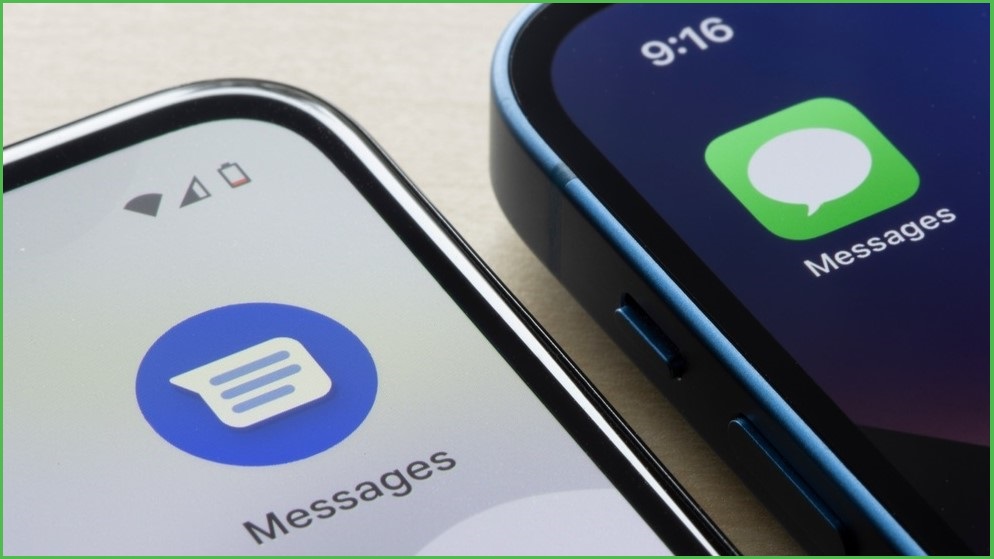iPhones will no longer treat Android users like second-class citizens, with Apple upgrading the so-called ‘green bubble’ as it tries to pre-empt regulatory intervention by supporting the Rich Communication Services (RCS) industry standard in its iMessage communications app.
A GSM Association (GSMA) standard that has been available on Australian Android phones since Telstra launched it in 2017, RCS is a next-generation messaging service enabling features such as personalisation and interactive messaging, sharing of files and photos, read receipts, the ability to monitor when someone is typing a message, and group chats across any messaging app that supports the standard.
Google’s broad support for RCS has made the messages the de facto standard on Android devices, but until now Apple – which offers similar features through the iMessage platform that powers the Messages app in all of its devices – has declined to support RCS.
This means that messages sent from iPhones to Android users are stripped of special features, sent as basic SMS or MMS messages, and marked with green bubbles to distinguish them from blue Messages bubbles – a practice that has been referred to as the “green bubble shame”.
An update “later next year” will give the green bubble full support for RCS Universal Profile (UP) – a mobile industry standard on which Google has based its RCS Business Messaging variant – bringing its capabilities on par with those available through iMessage’s blue bubbles.
Apple plans to keep using green and blue bubbles to distinguish between the two platforms – but the change, the company said in a statement, “will offer a better interoperability experience when compared to SMS or MMS” and “work alongside iMessage, which will continue to be the best and most secure messaging experience for Apple users.”
Interoperability isn’t the only benefit of RCS UP, however, with the protocol also supporting anti-spam features such as sender identification and the end-to-end encryption of messages – something that has been lost when iMessage converts messages to SMS and MMS.
Ensuring messages remain encrypted from sender to recipient has been critically important in the messaging world, with iMessage, WhatsApp, Telegram, Signal and the like touting their security – and smartphone contender Nothing recently pulling its iMessages and RCS compatible messaging app, Nothing Chats, after it was revealed that messages were being transmitted without any encryption at all.
Regulators calling the shots
RCS support will allow iPhones, iPads and Macs to communicate with Android-based equivalents without losing features – a point that Google has repeatedly made during a publicity campaign called Get the Message that argues “it’s 2023, and texting shouldn’t feel like using a pager.”
Yet Google isn’t the only one pressuring Apple to support RCS: in September, the European Union (EU) designated Apple as one of six core ‘gatekeepers’ under its Digital Markets Act (DMA) – the same legislation that recently forced Apple to abandon its proprietary Lightning connector and release its latest iPhones with USB-C connectivity instead – meaning that the services “provide an important gateway between businesses and consumers in relation to core platform services.”
With 22 core platform services already designated, the decision to support RCS is an olive branch from Apple, which now faces a new EU investigation that will decide whether iMessage should be added to the list of gatekeeper services – in which case, Apple would be forced to add such interoperability anyway.
“The accolade for making Apple bow goes to the EU,” GlobalData technology analyst Ardit Ballhysa said in an analysis of the RCS announcement, noting that the DMA “has so far proven to be the single most influential regulatory legislation for reigning in big tech in history…. It is no coincidence that Apple chose to support RCS during a time in which the EU is assessing whether iMessage should fall under the category of a gatekeeper service.”
Designating iMessage as a gatekeeper service could potentially force Apple to release a version of iMessage on Android and other devices, Ballhysa said, noting that would be a blow for Apple’s strategy of using the blue tick/green tick dichotomy to “maintain the socially valued exclusivity around iMessage and [allowing] iMessage to serve as a key driving force behind strong iPhone sales.”










